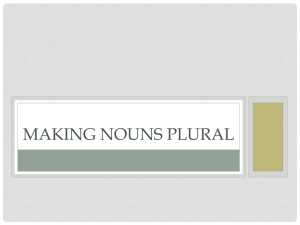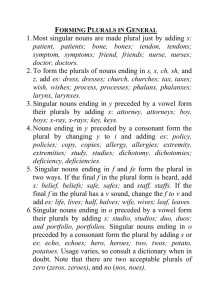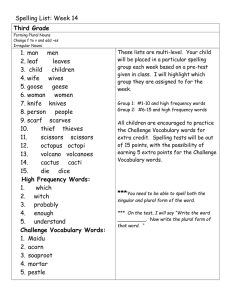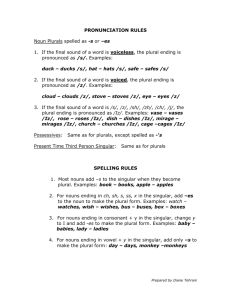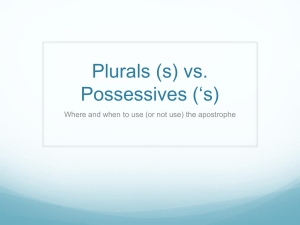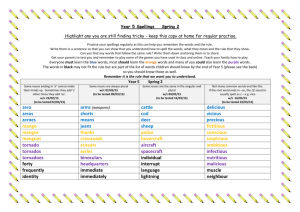ENGLISH PLURALS
advertisement
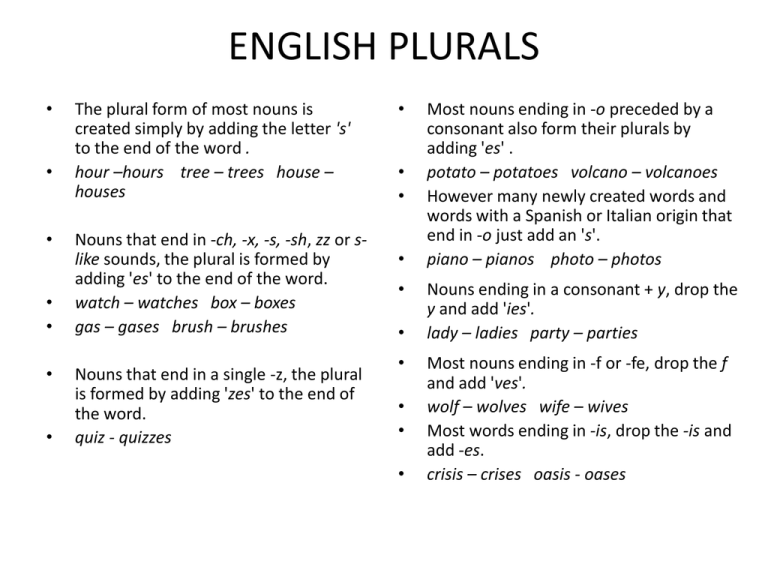
ENGLISH PLURALS • • • • • • • The plural form of most nouns is created simply by adding the letter 's' to the end of the word . hour –hours tree – trees house – houses Nouns that end in -ch, -x, -s, -sh, zz or slike sounds, the plural is formed by adding 'es' to the end of the word. watch – watches box – boxes gas – gases brush – brushes Nouns that end in a single -z, the plural is formed by adding 'zes' to the end of the word. quiz - quizzes • • • • • • • • • • Most nouns ending in -o preceded by a consonant also form their plurals by adding 'es' . potato – potatoes volcano – volcanoes However many newly created words and words with a Spanish or Italian origin that end in -o just add an 's'. piano – pianos photo – photos Nouns ending in a consonant + y, drop the y and add 'ies'. lady – ladies party – parties Most nouns ending in -f or -fe, drop the f and add 'ves'. wolf – wolves wife – wives Most words ending in -is, drop the -is and add -es. crisis – crises oasis - oases • • • • • • There are many common nouns that have irregular plurals. man - men woman - women child – children mouse - mice tooth - teeth goose - geese foot - feet ox – oxen person – people • • • • • • • • • • • • • • • Some nouns have identical plural and singular forms, although they are still considered to have a plural form. sheep – sheep fish – fish aircraft – aircraft Uncountable nouns on the other hand have no plural form and take a singular verb (is / was ...). advice money information traffic news sugar • • • • • • • • • Some nouns (especially those associated with two things) exist only in the plural form and take a plural verb (are / were...). cattle scissors trousers tweezers Nouns that stem from older forms of English or are of foreign origin often have odd plurals. index - indices or indexes phenomenon – phenomena antenna - antennae – antennas cactus – cacti – cactuses In compound nouns the plural ending is usually added to the main noun. passer-by - passers-by mother-in-law – mothers-in-law fireman – firemen attorney general - attorneys general Exercises: 1. Write the plural of each of these nouns: dress - …………………………… brush - ………………………….. touch - ……………………………… wish - ……………………………. class - …………………........... sketch - ………………………………… fox - ……………………………… cross - ……………………………. star - …………………………………… bench - ………………………… bush - ………………………… city - ……………………………......... ax - …………………………….. grass - ………………………… cherry - ……………………………… mantis - ………………………. buzz - …………………………… essay - ………………………………… box- …………………………….. dish - ……………………………… baby - ………………………………… church - ……………………… boy - …………………………… story - …………………………………… volley - ………………………… chimney - ……………………… day - ……………………………… cargo - ……………………… mosquito - ……………………… hero - ……………………………… canto - ………………………… solo - …………………………… piano - ………………………………… leaf - ……………………………… life - ……………………………… loaf - ………………………………… shelf - ………………………… half- …………………………… chief - ……………………………… roof - ………………………… belief - ……………………………….. 2. Turn the following sentences into singular: •Dogs are good friends to men. ………………………………………………………………………………………. •Fir trees grow in the mountains. ……………………………………………………………………………………….. •Women do not watch football matches. ………………………………………………………………………………………. •Children usually change their teeth when they are six years old. ………………………………………………………………………………………. •These men have got new cars. ………………………………………………………………………………………. •Those geese are right next to the horses. ……………………………………………………………………………………….
